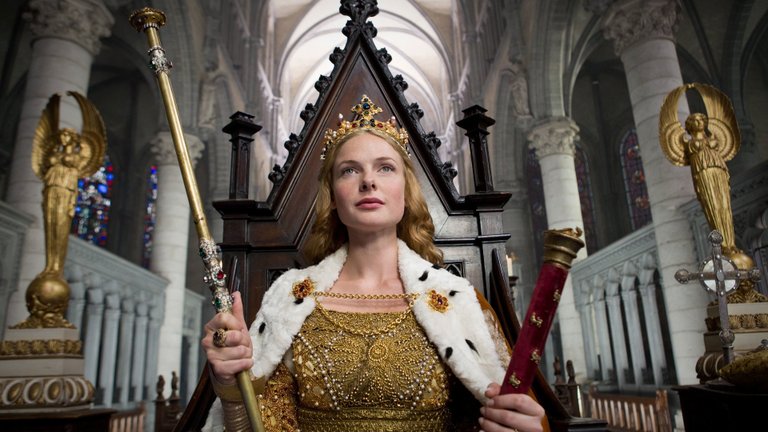Television Review: The White Queen (2013)

The Game of Thrones would likely have had a bigger audience if many viewers, to whom its content would have appealed, simply had the patience to wait a decade for HBO to deliver some kind of closure to its epic story—a closure that would be more satisfactory. Fortunately, the solution to this problem was found several centuries earlier in England. Namely, George R.R. Martin found inspiration for the intricate plots and characters of his epic cycle precisely in the history of the British Isles, and most notably in one of its most vivid and bloodiest periods: the Wars of the Roses in the 15th century. In dysfunctional rulers, unimaginable cruelty, sordid sex, spectacular battles, Byzantine court intrigues, and the unscrupulous struggle of feudal clans for power, along with some (according to contemporary sources mentioned) magic (though without dragons and zombies), one cannot fail to recognise a crystal-clear blueprint for the most popular TV series of the 2010s. The potential for exploiting these events through fiction has, of course, been recognised for ages, and Shakespeare earned his fame on London stages through historical dramas dealing with that very subject. Modern authors have followed his path, including Philippa Gregory, an exceptionally popular author of historical novels whose 2009 book The White Queen became a bestseller and inspired a 2013 ten-part miniseries.
The protagonist, portrayed by Swedish actress Rebecca Ferguson, is Elizabeth Woodville, an English noblewoman and member of the family that traditionally supported King Henry VI and the House of Lancaster. The plot begins in 1464, several years after her side had been defeated, her husband killed, and power seized by the House of York under young King Edward IV (Max Irons). When they chance upon each other, the king is smitten by her beauty. Despite her being older than him, belonging to the enemy camp, and having the scandalously humble origins of a squire’s daughter, he secretly marries her. When he announces this decision at court, it delights Elizabeth’s numerous family, whose members can now anticipate wealth, influence, and prestigious titles. For most courtiers and York loyalists, this is a scandal, but none is more affronted than Edward’s closest friend and ally, Richard Neville (George Fearnley), the Earl of Warwick, whose dynastic plans for his two daughters—the elder Isabel (Eleanor Tomlinson) and the younger Anne (Faye Marsay)—are significantly disrupted. All this is observed by Lady Margaret Beaufort (Amanda Hale), the widow of a deceased Lancastrian magnate, who—unlike Elizabeth—openly harbours hostility toward the House of York and deeply believes that her young son Henry Tudor will one day become king.
The series is a co-production of the BBC and Starz, the latter suggesting viewers will get a decent dose of explicit violence, sex, and nudity. Such content exists, though far below the standards Starz established with Spartacus. Thus, among other things, fans can feast their eyes on how Max Irons and Rebecca Ferguson, a Hollywood A-lister, look without their clothes. However, all this, as it should be, takes a backseat, as audiences are far more intrigued by the depiction of one of Britain’s most fascinating historical chapters and an even more fascinating reinterpretation through the lens of historical revisionism and feminist readings that attempt to explain decades of bloodshed through the conflicting ambitions of several powerful women. The problem, of course, is that not all these women are equally compelling, or rather Woodville is reduced to a secondary role after her marriage to Edward. This leaves Ferguson—though this series helped her continue her successful international career—with little chance to develop her character. This task is far better executed by Marsay as the initially naive and kind-hearted teenager whose traumas from court intrigues transform her into a ruthless manipulator. Even more impressive is Amanda Hale as the woman who, among all ladies of the court, is notably plain and burdened by religious fanaticism, yet her performance is so compelling that she could arguably be called the series’ true protagonist. In The White Queen, the revisionist approach is also reflected in casting: the future King Richard III, infamous thanks to Shakespeare as one of literature’s most repellent villains, is portrayed here as a deeply sensitive and compassionate patriot driven by genuine desire for the welfare of his subjects, ably performed by Aneurin Barnard, known for his role as the anonymous protagonist in Dunkirk.
The series was primarily aimed at a British audience, so its condensed version of two decades of events into ten hours may pose challenges for viewers from other countries, especially those insufficiently versed in English history or Shakespeare’s works. In some scenes, the modest budget is evident, such as when some of the bloodiest and most spectacular battles are portrayed as minor family squabbles in Belgian forests. Despite all this, The White Queen deserves recommendation, even for those not deeply invested in how Game of Thrones might have unfolded in real life.
RATING: 7/10 (+++)
(Note: The text in its original Croatian language version was posted here
Blog in Croatian https://draxblog.com
Blog in English https://draxreview.wordpress.com/
InLeo blog https://inleo.io/@drax.leo
LeoDex: https://leodex.io/?ref=drax
Hiveonboard: https://hiveonboard.com?ref=drax
InLeo: https://inleo.io/signup?referral=drax.leo
Rising Star game: https://www.risingstargame.com?referrer=drax
1Inch: https://1inch.exchange/#/r/0x83823d8CCB74F828148258BB4457642124b1328e
BTC donations: 1EWxiMiP6iiG9rger3NuUSd6HByaxQWafG
ETH donations: 0xB305F144323b99e6f8b1d66f5D7DE78B498C32A7
BCH donations: qpvxw0jax79lhmvlgcldkzpqanf03r9cjv8y6gtmk9
This is a fantastic and thoughtful comparison between Game of Thrones and the historical roots it draws from.